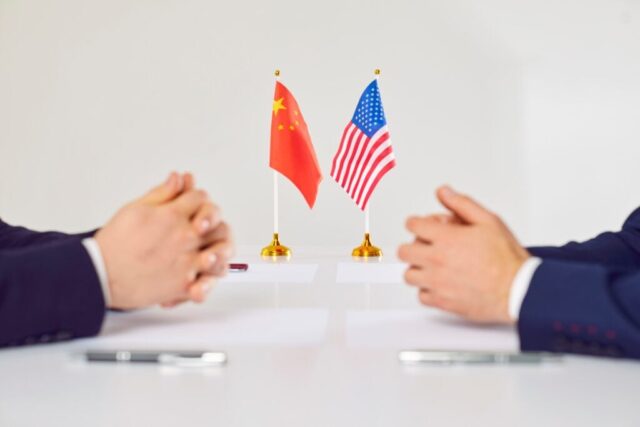ADVERTISEMENT
The new land ownership laws for foreigners have prompted U.S. citizens of Chinese descent to reevaluate their political affiliations, particularly those who, like Diana Xue, previously supported the Republican Party.
Xue, a resident of Orlando, Florida, had consistently voted Republican, aligning with her husband, friends, and neighbors. However, this year, she broke with that tradition.
This shift was triggered by a Florida law prohibiting non-permanent resident Chinese citizens from purchasing property in the state. For Xue, who immigrated from China to study and became a U.S. citizen a decade ago, this measure represented a “legalization of discrimination” against people of Chinese origin.
Florida has traditionally been a Republican stronghold, but for Xue, this law was the final straw. “Because of this law, I will start working to change every seat I can,” she stated. Florida’s situation is not isolated; at least two dozen states have proposed similar laws limiting property purchases by Chinese citizens and other foreigners.
Many Republican legislators cite concerns about intelligence and economic threats from China as justification for these laws. When signing the legislation, Florida Governor Ron DeSantis labeled China as the “greatest geopolitical threat” to the U.S., asserting that the law was a measure against the Chinese Communist Party.
These laws have served as a “wake-up call” for some naturalized Chinese citizens, pushing them toward the Democratic Party out of fear of being unfairly targeted because of their ethnicity. Meanwhile, tensions between the U.S. and China escalated in 2023 when a suspected Chinese spy balloon was detected over Montana, leading states like Missouri, Texas, and Tennessee to introduce similar measures.
The laws restrict land purchases near critical infrastructure or military bases for Chinese citizens and those from other nations deemed adversarial, with limited exceptions for people with asylum or non-tourist visas. According to the National Agricultural Law Center, 24 states currently prohibit or restrict foreign ownership of agricultural land for non-permanent residents.
Liu Pengyu, spokesperson for the Chinese embassy in Washington, expressed concern over the growing hostility toward the Asian community in the U.S., viewing it as contradictory to the free-market principles and international trade that the U.S. claims to uphold. These laws could also deter foreign investors who might contribute to revitalizing the U.S. economy, as noted by John Ling, an expert in attracting Chinese manufacturing projects to the U.S.
One example of the challenges facing companies with Chinese capital is Walton Global, a private land management firm. Walton has been classified by the U.S. Department of Agriculture (USDA) as one of the top five Chinese owners of U.S. agricultural land, a designation the company disputes, arguing that its investor base is global, not primarily Chinese.
Since 2018, Walton Global has opened four offices in China, raising suspicion in a politically charged climate particularly sensitive to foreign investments ahead of the 2024 elections. The company has requested that much of its land be reclassified as owned by investors from other countries, citing misclassification by the USDA.
Walton’s properties near military installations have faced constant scrutiny, with some critics warning of potential national security risks linked to foreign ownership in strategic areas. The controversy has led both Republicans and Democrats to consider new laws for closer scrutiny of foreign acquisitions.
Walton Global, however, insists it is not a “Chinese” company, emphasizing its global investor network and developments in other countries. The company argues that foreign investment in U.S. agricultural land is complex, and its impact on national security should be assessed carefully rather than through generalizations.
The uncertainty created by these laws has also confused real estate agents and brokers. Angela Hsu, a real estate attorney in Atlanta, noted that many brokers are trying to understand the legal implications of these restrictions to avoid potential penalties, following the recent signing of a similar law in Georgia.
At the federal level, the House of Representatives passed a bill in September requiring the reporting of agricultural land purchases by citizens of China, Russia, North Korea, and Iran. However, the measure is unlikely to pass in the Senate.
The growing trend of restricting land purchases in the U.S. has raised alarms not only within the Asian community but also among economic experts. Chris Suh, a history professor at Emory University, pointed out that policies excluding foreigners not only create division but may also harm the economy, as seen in the past when Chinese railroad workers were excluded.
The Walton Global case, like that of other Chinese investors, reflects the diverse perspectives and political tensions surrounding foreign investment in U.S. lands. In a context of increasing political and security concerns, debates over foreign land ownership in the U.S. will likely continue in the years to come.
María Herrera Mellado es una abogada de EE.UU. y licenciada en España. Doctora en Ciencias Jurídicas y Analista política. La Dra. Herrera es conocida por su amplia experiencia en análisis y consultas en el diseño de políticas públicas, propuestas de ley y gestión en relaciones internacionales.
Su reconocimiento proviene de sus contribuciones al análisis y representación legal de diversas organizaciones, empresas e individuos que han visto abusados sus derechos humanos, su privacidad o en la inclusión de políticas efectivas fundamentalmente en el ámbito de la transparencia y la rendición de cuentas, así como la lucha contra la corrupción.
Su formación académica y experiencias profesionales la convierten en una voz respetada en el debate público y en el análisis de temas de actualidad sobre todo en los desafíos políticos y legales contemporáneos.
María Herrera Mellado is a U.S.-based attorney also licensed in Spain. She holds a PhD in Legal Sciences and is known as a media legal and policy analyst.
Dr. Herrera is recognized for her extensive experience in analyzing and consulting on public policy design, legislative proposals, and international relations management.
Her recognition stems from her contributions to the analysis and legal representation of various organizations, companies, and individuals whose human rights or privacy have been violated, or who have benefited from the inclusion of effective policies, primarily in the areas of transparency, accountability, and the fight against corruption.
Her academic background and professional experience make her a respected voice in public debate and in the analysis of current issues, particularly in contemporary political and legal challenges.











